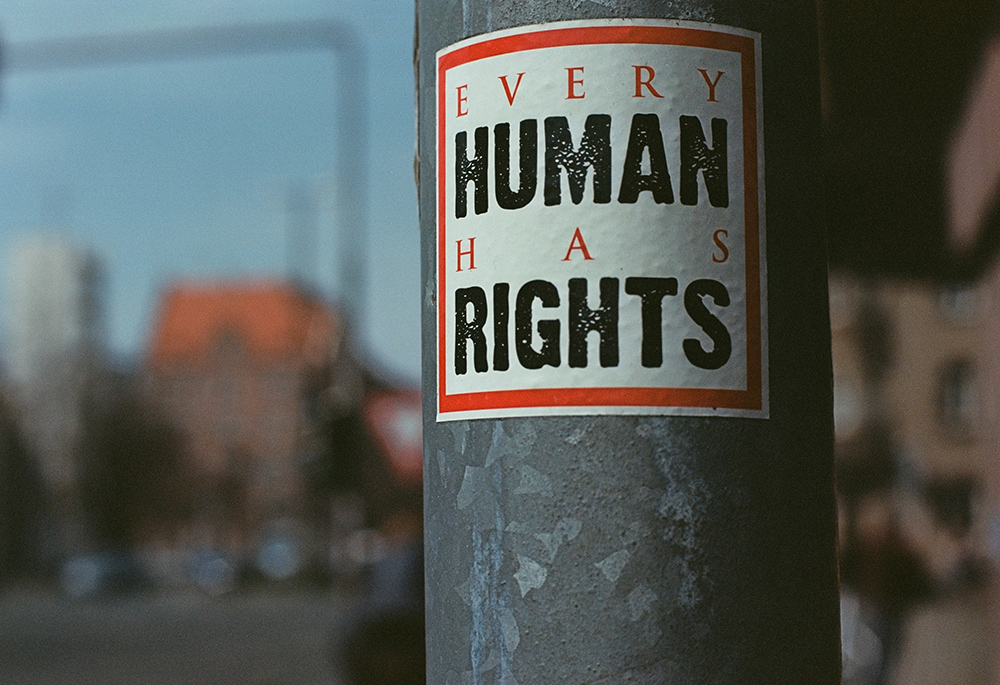
(Unsplash/Markus Spiske)
Gov. Ron DeSantis of Florida recently pledged to end "birthright citizenship," the automatic citizenship granted to every child born in the United States. Whatever his political rationale, his position might spur us to ask: What makes a person a genuine U.S. citizen? Is it luck? An accident of birth? Participation in democracy? Is it earned? Given? Chosen?
Although contemporary conflicts over citizenship find little echo in Jesus' time and place, they do highlight some of the same underlying issues. In Jesus' day, the citizenship that counted was Roman, and it came in degrees. Citizenship depended, among other things, on class and gender.
St. Paul's Roman citizenship gave him distinct advantages he did not hesitate to use when it would promote the Gospel. But more than questions of citizenship, Paul, the Apostle to the Gentiles, wanted his people to understand the implications of being Christian: bona fide members of the body of Christ (Romans 12).
Concerns about who is in and who is out are as old as nature. Wolves move in packs and geese in flocks; we humans organize ourselves in families, tribes, nations, religions and all sorts of groups that give us identity and reciprocal responsibilities. Groups have boundaries.
In Isaiah's time, Israelites identified themselves as the people of the Covenant, God's chosen people. Isaiah wanted them to realize that their privilege was not for themselves, but for the sake of the world (Isaiah 42:5, 66:20). But as Isaiah, Jesus and Paul knew well, it's hard to free people from their ethnocentrism — the pride being part of an exclusive pack.
In today's Gospel (Matthew 15:21-28), even Jesus seems surprisingly ethnocentric. Note how Matthew set the stage for this incident. In Matthew 15:1-20, Jesus had taught that strict observance of the law was less important than the attitude of one's heart. Immediately after that, he slipped off to the borderlands, seeking some quiet time (Mark 7:24). Instead of rest, Jesus found himself besieged by a relentless, foreign woman — a person with two major cultural/religious strikes against her.
Although preachers and teachers often try to wriggle around it, the first part of this incident paints Jesus in less than sterling colors. First, the disciples say, "Send her away!" That's exactly what they said about the hungry thousands who had previously interrupted Jesus' solitude. In that instance, Jesus challenged the disciples to give their all to the people — almost certainly a Jewish group (Matthew 14:13-21).
Now, instead of being swayed by this foreign woman's need, Jesus contends that only Israelites figure among the sheep he shepherds. It was as if the woman's plea was a temptation, an attempt to divert him from his mission to the people of the Covenant.
While that may have satisfied the disciples, the woman's unyielding love for her daughter impelled her to kneel before him and beg again for help. He dismissed her with what was probably a common cultural insult: "Dogs don't get to eat at our table!"
Advertisement
That did nothing to dissuade this intrepid woman. With a mischievous reminder that dogs are far cleverer than sheep, she turned the slight inside out and said that she could content herself with scraps if he could find the generosity to share them.
That got through to him. With the same desperate insistence as the woman who snatched a healing by touching his cloak (Matthew 9:20-22) and the unrelenting widow of Luke 18, this nameless woman demonstrated prophetic faith. As someone Isaiah might call a "foreigner who joined herself to the Lord," she pushed Jesus and companions to accept that distinctions of gender and nationality are ultimately meaningless. She called them to remember that God's creation has no borders; humanity knows no nationality. In effect, she was asking Jesus to act like the good Samaritan of Luke 10.
The challenges these readings give us today are almost too obvious to mention. They have to do with how we identify ourselves in relation to others. They pose questions that include the following: Do we see the world in terms of clear divisions or in a process of growing unity? Where are the boundaries of our sense of solidarity? How does our membership in the body of Christ condition our relationships? Whose burden is also our own? Who is calling us to enlarge our perception and participation in the body of Christ today?
Beyond that, we might ask, "If Jesus himself needed a persistent stranger to call him beyond a limited viewpoint, to whom should we be listening today?"
A hint: We might look to people with two or more strikes against them. They, more than others, can remind us that as human beings we share one and the same birthright and vocation: to love and be loved as God's chosen.








